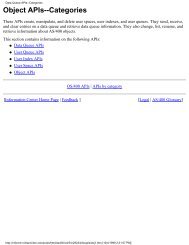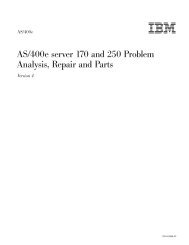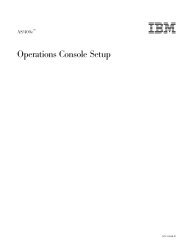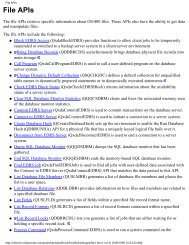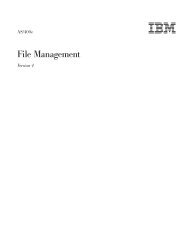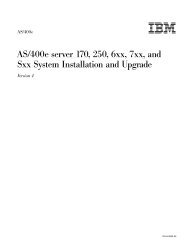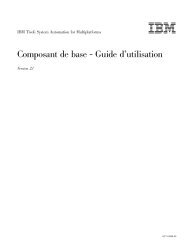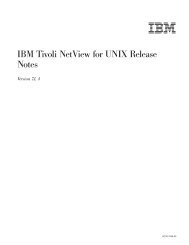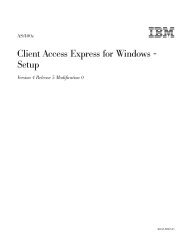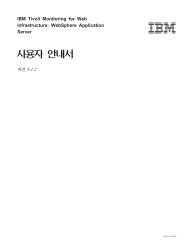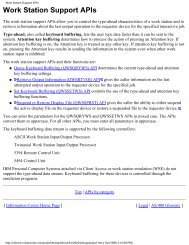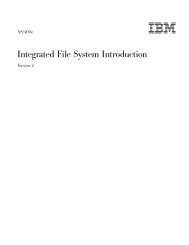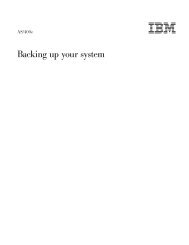Qshell Interpreter (qsh) - FTP Directory Listing - IBM
Qshell Interpreter (qsh) - FTP Directory Listing - IBM
Qshell Interpreter (qsh) - FTP Directory Listing - IBM
You also want an ePaper? Increase the reach of your titles
YUMPU automatically turns print PDFs into web optimized ePapers that Google loves.
Word expansions<br />
Tilde expansion<br />
Parameter expansion<br />
16 <strong>Qshell</strong> <strong>Interpreter</strong> (<strong>qsh</strong>)<br />
QSH_USE_PRESTART_JOBS (Use pre-start jobs when available)<br />
This variable determines if processes started by <strong>qsh</strong> use prestart jobs when<br />
available. When the value of the variable is Y, <strong>qsh</strong> uses prestart jobs if they<br />
are available in the current subsystem. When the value of the variable is<br />
not Y or prestart jobs are not available, the processes started by <strong>qsh</strong> are<br />
batch immediate jobs. The default value is Y.<br />
QSH_REDIRECTION_CODEPAGE (Set code page for file redirection)<br />
When this variable is set to a numeric value, <strong>qsh</strong> opens files specified on<br />
redirections in the specified code page. By default, the variable is not set<br />
and files are opened in the code page associated with the job.<br />
QSH_REDIRECTION_TEXTDATA (Process data as text for file redirection)<br />
This variable determines if data read from or written to a file specified on a<br />
redirection is treated as text data or binary data. When the value of the<br />
variable is Y, <strong>qsh</strong> treats the data read from or written to the file as text data.<br />
When the value of the variable is not Y, <strong>qsh</strong> treats the data read from or<br />
written to the file as binary data. The default value is Y.<br />
SHELL (Path name of the shell)<br />
When running a script file that does not contain “#!”, <strong>qsh</strong> uses the value of<br />
this variable as the path name of the shell interpreter to run the script.<br />
There is no default value.<br />
[ Legal | AS/400 Glossary ]<br />
An unquoted tilde character (x) at the beginning of a word is expanded to the user’s<br />
home directory. All the characters up to a slash (/) or the end of the word are<br />
treated as a user name and are replaced with the user’s home directory. If the user<br />
name is not present (as in x/foobar), the tilde is replaced with the value of the<br />
HOME variable (the current user’s home directory).<br />
The format for parameter expansion is as follows:<br />
${expression}<br />
where expression consists of all characters until the matching right brace (}). Any<br />
right brace characters escaped by a backslash or within a quoted string, and<br />
characters in embedded arithmetic expansions, command substitutions, and<br />
variable expansions, are not examined in determining the matching right brace.<br />
The simplest form for parameter expansion is:<br />
${parameter}<br />
The value, if any, of parameter is substituted. The parameter name or symbol can<br />
be enclosed in braces, which are optional except for positional parameters with<br />
more than one digit or when parameter is followed by a character that could be<br />
interpreted as part of the name. If a parameter expansion occurs inside<br />
double-quotes, then:



